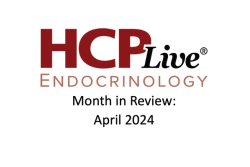
OR WAIT null SECS
GLP-1 RA and Sleep Apnea
Can adding a GLP-1 receptor agonist to lifestyle changes improve obstructive sleep apnea management in your patients?
Treatment with the glucagon-like peptide (GLP)-1 receptor agonist liraglutide 3.0 mg combined with improvements in diet and exercise resulted in significant improvements in obstructive sleep apnea and several measures of cardiovascular risk, according to the results of a study published in the International Journal of Obesity.
“This study suggests that liraglutide 3.0 mg in conjunction with a diet and exercise regimen may be useful as a weight management component of a comprehensive therapeutic approach for obstructive sleep apnea management,” wrote Adam Blackman, MD, of Toronto Sleep Institute, MedSleep and University of Toronto, and colleagues. “Given its range of beneficial pharmacodynamic effects, liraglutide 3.0 mg may also be a useful tool in individuals already on CPAP treatment.”
Liraglutide currently has marketing approval in several countries for weight management. Because weight loss has been associated with improvements in obstructive sleep apnea, Blackman and colleagues conducted this study to investigate if liraglutide plus lifestyle changes could improve sleep apnea better than lifestyle changes alone.
Participants in the study had moderate (apnea-hypopnea index [AHI] 15.0-29.9 events per hour) or severe (AHI 30 events per hour or more) obstructive sleep apnea, and were either unable or unwilling to use CPAP therapy. All patients received counseling on diet and physical activity every 4 weeks with (n=180) or without (n=179) liraglutide.
After completing treatment with liraglutide, patients had a mean reduction in AHI of -12.2 events per hour compared with -6.1 events per hour for patients assigned to placebo (P=0.0150). In addition, treatment with liraglutide resulted in a greater percentage weight loss compared with placebo (-5.7% vs. -1.6%; P<0.0001).
“Accompanying the AHI reduction, consistent trends for improvement were also seen with liraglutide versus placebo across oxygen saturation, sleep architecture and sleep/health-related quality of life endpoints,” the researchers wrote. “Improvements in obstructive sleep apnea endpoints were related to the degree of weight loss at the end of the study, with greater improvement seen with greater weight loss.”
In addition, the researchers noted that the largest improvement in AHI were seen in those patients with the most serve sleep apnea at baseline.
The researchers also observed significant improvement in several cardiovascular measures for patients assigned liraglutide. Patients on liraglutide had significant reductions in systolic blood pressure (-3.4 mmHg vs. 0.0 mmHg; P<0.0003), HbA1c (-0.4% vs. -0.2%; P<0.0001), and fasting plasma glucose (-0.2 mmol/L vs. 0.2 mmol/L; P<0.0001).
The trial was limited by its duration, which may not have allowed for maximum weight loss and observation, the researchers noted.
“Although power was maintained, approximately 23% of participants across both groups withdrew before trial completion,” the researchers wrote. “This attrition rate is reasonable given the difficulty of retaining patients in sleep apnea trials (due to the discomfort/burden associated with overnight PSG assessments), and corresponds to that seen in another obstructive sleep apnea trial with a large sample size.”
Reference: Blackman A, et al. Effect of liraglutide 3.0 mg in individuals with obesity and moderate or severe obstructive sleep apnea: The SCALE Sleep Apnea randomized clinical trial. Int J Obes (Lond). Epub 2016 March 23.


